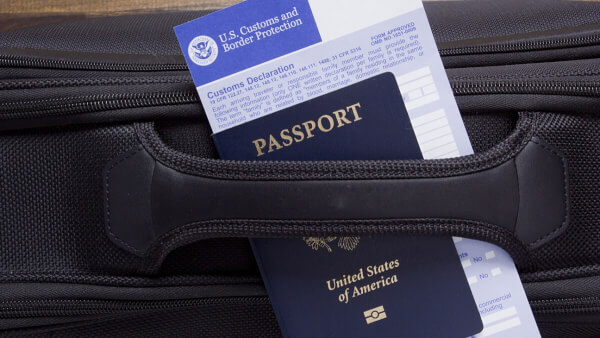Requirements to travel to Canada with a dog: US guide
Heading to Canada with your furry friend? Find out what documents you need when traveling with a dog.

Whether you're planning a weekend getaway or heading to Canada for business, you can cross the border from the US by car. It can be faster and cheaper than flying, especially if you live in a nearby state.
Most of the time, US citizens and residents just need their passports to cross the border. The process is generally quick and hassle-free, but there are still a few important things that you need to know to prepare for your trip. Here's what they are.
We'll also introduce the Wise account, which allows you to send, spend, and receive your money across the globe in over 40 currencies – all at the fair mid-market rate.
The most important document you'll need to travel from the US to Canada by car is a valid ID. For most people, this means a passport.
| If you're a US citizen, you'll need at least 1 of the following:¹ |
|---|
|
While these other options (like a birth certificate) exist, the Government of Canada website explicitly warns that "A passport is the only reliable and universally accepted travel and identification document when abroad," so that's the best thing to have with you.¹
If you're a US permanent resident, you'll typically need both proof of citizenship (your passport) and proof of your US status (such as a Green Card). But if you're entering Canada directly from the US, your Green Card alone will be enough.¹
Beyond ID requirements, make sure you have your standard driving paperwork ready.
Your US driver's license works fine in Canada as long as you're just visiting (US citizens can stay for up to 180 days).² Bring your car registration and proof of insurance too, because border officers may ask to see these documents.
US citizens and permanent residents typically don't need an eTA (Electronic Travel Authorization) when driving to Canada from the US.
You'll need some additional paperwork if you're driving with children or minors.
Always carry copies of legal custody documents if they apply to your situation, and make sure you arrive at the border in the same vehicle as any minors you're traveling with.
You'll also need a consent letter if you share custody with someone who isn't traveling with you, or if you're not the child's parent or legal guardian. This letter must include the full name, address, and phone number of the custodial parents or legal guardians.¹
No, there's no entry fee for crossing the US-Canada border. It's free.
However, you might need to pay duties (special taxes) on certain items you bring with you, depending on what they are and their value. But if all you're bringing are just normal personal belongings, you most likely won't have to pay anything.
You can bring personal items that you plan to use during your trip and take back home with you. This includes belongings like your clothes, camping and sports gear, cameras, laptop, phone, and your car itself.³
You can't sell your personal items, use them for business purposes, or leave them behind in Canada. If you plan to do any of these things, you must declare your intentions and will likely need to pay duties or taxes.
Additionally, there are special rules for:
Food, plants, animals, and pets: You must declare them, and if you don't, the border officers can seize them and impose penalties up to 1,300 CAD — This applies to any food you bring and to pets like your dog or cat³
Alcohol, tobacco, and vaping products: You'll have to declare these items and meet the minimum age requirements to use them
Gifts: You'll need to declare any gifts you're bringing into Canada, but you won't pay duties or taxes if they are worth less than 60 CAD³
Most regular personal belongings are fine to bring into Canada. However, there are certain restricted items or things that you'll need special permits for, including:⁴
- Firearms and weapons
- Explosives, fireworks, and ammunition
- Cannabis
- Consumer products
- Pesticides
These items are typically impossible to bring into Canada, or you'll need to secure extensive permissions.
Organize your passport, Green Card (if applicable), driver's license, car registration, and insurance documents, and keep them together in one place. If you're traveling with children or minors, make sure you have all of the appropriate custody documents with you (including the consent letter).
Border wait times depend on the crossing point, day of the week, and time of day. You can check real-time wait times online to choose the best route and timing for your crossing.
Make a list of everything you're bringing that needs to be declared. This includes food, plants, animals, alcohol, tobacco products, vaping products, and gifts.
If you need to bring any restricted items with you, make sure to have proper permissions in place.
If you're traveling to Canada with pets), you'll typically need a valid rabies vaccination certificate. However, requirements vary depending on the type of animal you're bringing.
Check the specific requirements for your pet before traveling (you can do it online on the Government of Canada website).
You'll want some CAD for your trip, but currency exchange often comes with high fees. Banks and exchange counters typically offer unfavorable rates with high markups, so consider alternatives like Wise.
| 💡 Learn how to get Canadian money in the US in our full guide. |
|---|
Withdrawing your travel money with a card once you arrive in Canada will usually get you a more favorable exchange rate compared to changing cash in the US. Choose a Wise account and multi-currency card, and you could get an even better deal on spending and withdrawals in Canada.
Wise Accounts can hold 40+ currencies and always offer the mid-market exchange rate for spending and withdrawals.
That means you can top up your Wise Account in dollars and switch to CAD as and when you need to — or have the Wise Multi-Currency Card auto-convert to the currency you need with the lowest available fee for convenience.
It’s free to open a Wise Account online or in the Wise app, with no minimum balance and no monthly fee — take a look today to see how much you can save.
Please see Terms of Use for your region or visit Wise Fees & Pricing for the most up-to-date pricing and fee information.
You'll need proof of citizenship or US status, such as your passport or Green Card. Just like when entering Canada, you'll also need your driver's license, car registration, and insurance documents readily available.
You'll also need to declare any goods you purchased in Canada that exceed your personal exemption limits. The US has duty-free allowances for items like alcohol, tobacco, and general merchandise, but anything over these limits may be subject to duties and taxes.
There are more than 100 land crossings between the US and Canada.⁵ However, not all of them are always open. Many smaller crossings have limited hours or seasonal schedules.
No, a US driver's license isn't enough to cross the Canadian border. You'll need proof of citizenship (and residency, if applicable), such as your passport or a Green Card.
However, your US driver's license is valid for driving in Canada as a visitor. You don't need to get a special permit or a Canadian driving license.
Certain criminal convictions can make you inadmissible to Canada, including DUI offenses, drug-related crimes, theft, assault, and domestic violence charges.⁶ It can be hard to enter Canada if you have a criminal record.
It's relatively straightforward for US citizens or residents to travel from the US to Canada by car as long as you have a valid form of ID, such as your passport (or a Green Card, if applicable).
However, one aspect many travelers underestimate is currency exchange. Those markup fees can really add up and eat into your travel budget.
To spend money in Canada like a local — all with no currency exchange rate fees — use Wise.
Sources
*Please see terms of use and product availability for your region or visit Wise fees and pricing for the most up to date pricing and fee information.
This publication is provided for general information purposes and does not constitute legal, tax or other professional advice from Wise Payments Limited or its subsidiaries and its affiliates, and it is not intended as a substitute for obtaining advice from a financial advisor or any other professional.
We make no representations, warranties or guarantees, whether expressed or implied, that the content in the publication is accurate, complete or up to date.

Heading to Canada with your furry friend? Find out what documents you need when traveling with a dog.

Heading to Canada? Find out what document you’ll need as an American when entering the country.

In this article, we'll show you the best places to exchange money in Montreal – plus, a great alternative.

If you’re headed to Canada any time soon, you’re going to need Canadian Dollars. Luckily, despite its low population density, Canada has a large number of...

Alberta’s capital is a hub for culture and arts. Edmonton’s growing subculture is powered by the recent influx of creative types and unique festivals such as...

While Winnipeg isn’t as well known as Montreal or Toronto, it’s still an attractive place to visit. Whether you’re after breath-taking nature trails, cultural...